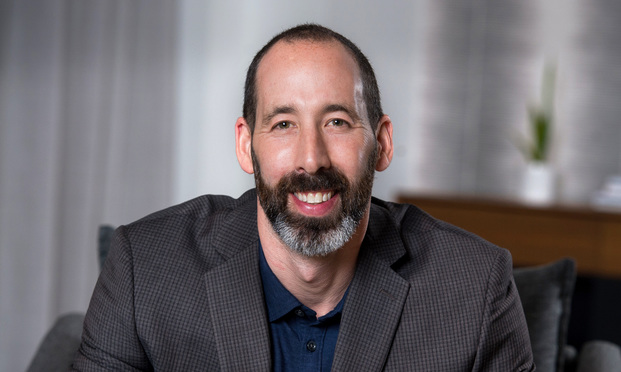'No One Really Knows How All This Is Going to Play Out': A Q&A with Axiom Executive VP David Pierce
Pierce, the San Francisco-based executive vice president and global head of commercial for alternative legal service provider Axiom, says that the "amount of work that is going to more traditional providers will probably shrink and most buyers will start to really think about whether the work streams are in the proper hands."
April 16, 2020 at 01:27 PM
6 minute read
The original version of this story was published on Corporate Counsel
 David Pierce, executive vice president and global head of commercial for Axiom.
David Pierce, executive vice president and global head of commercial for Axiom.
The COVID-19 outbreak is forcing many in-house leaders to adapt and rethink their budgets, how their legal departments work and their relationships with outside counsel. At the same time, companies and law firms are enacting pay cuts and layoffs.
Alternative legal service providers such as Axiom, Atrium, Elevate and Integron, have been gaining ground on traditional law firms. But the repercussions of the coronavirus pandemic could fuel dramatic growth for the industry as companies seek flexibility and cost savings for outside legal work.
When legal industry observers look back on what's happening now, they'll likely see this time as an evolutionary "leap moment" for alternative legal service providers, according to David Pierce, executive vice president and global head of commercial for Axiom.
Pierce, a former general counsel, CEO and Big Law attorney, spoke Wednesday with The Recorder affiliate Corporate Counsel about how COVID-19 might alter the landscape for legal departments, law firms and his industry. The conversation has been edited for clarity and length.
Corporate Counsel: This is an interesting time for alternative legal services providers.
David Pierce: No one really knows how all this is going to play out. We're so early on in it. But in my own experience, the industry that we're in has evolved slowly over time, and then you've got these inflection points. The evolutionary equivalent would be a leap moment. The financial crisis was a leap moment. We saw a lot of change immediately after. I think this is another big one.
CC: Talk about the big changes you saw in your industry after the recession. How might that inform what we can possibly expect?
DP: In 2006 or 2007, there were things happening then that you would never see today. Almost always if there was a legal ops function, it was not an empowered function. They didn't have authority in the business. In the mid-2000s, you didn't see the credibility and the command internally. I think that changed a ton after 2008. If you look now where we are compared with where we were then, it just feels really different. We felt a shift in who had real authority and what seat legal ops had at the table. I think people who recognize that there's a full universe of legal talent that does not exist solely in law firms or the ranks of in-house departments … will have much more authority and be more empowered by the business when we start to come out the other end of this.
CC: How do you see the coronavirus pandemic changing corporate legal departments? How do you see alternative legal service providers fulfilling certain needs that have arisen and will arise later as a result of what's going on right now?
DP: I think in-house teams have become big over time, and it made a lot of sense to do that. But it's inevitable, in my view, that we're going to see more legal work deconstructed. I think the biggest change that we're going to see in a few years, and maybe as soon as the back half of this year, is that the amount of work that is going to more traditional providers will probably shrink, and most buyers will start to really think about whether the work streams are in the proper hands.
CC: How do you think this is going to affect the way legal departments are staffed and how they work with outside counsel?
DP: Traditional large law firms are always going to have an important place in any major corporation's law department. I don't hear a lot of clients or GCs complaining about the senior partner or partner at $1,500 or $2,000 an hour. You make that call for a reason, and you get what you want almost every time. People who say Big Law is dying, I think they're wrong. I see a future where we're working more with some of those firms to complement the work they do and give them access to an efficient resource that clients are increasingly demanding. I think we'll see more collaboration with traditional firms and places like us. Some mid-market firms will not survive. The finances of some firms that run really lean, I don't know if they would have the ability to withstand a deep, long-lasting shutdown.
CC: OK. What about the in-house side?
DP: I don't think there's any going back from having a really robust, great in-house team. When you have in-house lawyers who really know your business, you win. You get better counsel. You get counsel steeped in the history and practicality of your product or service. I don't see a reality where there's no such thing as a sizable, robust in-house department. Will they shrink? In some ways, absolutely. In many larger, in-house groups, there are a lot of retirees coming up. There are people who are going to decide to leave the practice of law, and hopefully their nest eggs have survived and they have the ability to retire. There will be people who will leave in-house groups and will not be replaced. I think there will be a lot more room for some younger lawyers to step into the business as counselors who grew up as lawyers in an era where in-house lawyering meant something different. That level of lawyer, to me, is really important in most businesses. They are early enough in their career where their compensation is not prohibitive. The senior leaders, the GCs, they're going to need successors. That segment is not going to go poof all of a sudden.
This content has been archived. It is available through our partners, LexisNexis® and Bloomberg Law.
To view this content, please continue to their sites.
Not a Lexis Subscriber?
Subscribe Now
Not a Bloomberg Law Subscriber?
Subscribe Now
NOT FOR REPRINT
© 2025 ALM Global, LLC, All Rights Reserved. Request academic re-use from www.copyright.com. All other uses, submit a request to [email protected]. For more information visit Asset & Logo Licensing.
You Might Like
View All

Collectible Maker Funko Wins Motion to Dismiss Securities Class Action

How Tony West Used Transparency to Reform Uber's Toxic Culture

What Paul Grewal Has Learned About Advocacy as Coinbase's Top Lawyer
7 minute readTrending Stories
- 1'It's Not Going to Be Pretty': PayPal, Capital One Face Novel Class Actions Over 'Poaching' Commissions Owed Influencers
- 211th Circuit Rejects Trump's Emergency Request as DOJ Prepares to Release Special Counsel's Final Report
- 3Supreme Court Takes Up Challenge to ACA Task Force
- 4'Tragedy of Unspeakable Proportions:' Could Edison, DWP, Face Lawsuits Over LA Wildfires?
- 5Meta Pulls Plug on DEI Programs
Who Got The Work
Michael G. Bongiorno, Andrew Scott Dulberg and Elizabeth E. Driscoll from Wilmer Cutler Pickering Hale and Dorr have stepped in to represent Symbotic Inc., an A.I.-enabled technology platform that focuses on increasing supply chain efficiency, and other defendants in a pending shareholder derivative lawsuit. The case, filed Oct. 2 in Massachusetts District Court by the Brown Law Firm on behalf of Stephen Austen, accuses certain officers and directors of misleading investors in regard to Symbotic's potential for margin growth by failing to disclose that the company was not equipped to timely deploy its systems or manage expenses through project delays. The case, assigned to U.S. District Judge Nathaniel M. Gorton, is 1:24-cv-12522, Austen v. Cohen et al.
Who Got The Work
Edmund Polubinski and Marie Killmond of Davis Polk & Wardwell have entered appearances for data platform software development company MongoDB and other defendants in a pending shareholder derivative lawsuit. The action, filed Oct. 7 in New York Southern District Court by the Brown Law Firm, accuses the company's directors and/or officers of falsely expressing confidence in the company’s restructuring of its sales incentive plan and downplaying the severity of decreases in its upfront commitments. The case is 1:24-cv-07594, Roy v. Ittycheria et al.
Who Got The Work
Amy O. Bruchs and Kurt F. Ellison of Michael Best & Friedrich have entered appearances for Epic Systems Corp. in a pending employment discrimination lawsuit. The suit was filed Sept. 7 in Wisconsin Western District Court by Levine Eisberner LLC and Siri & Glimstad on behalf of a project manager who claims that he was wrongfully terminated after applying for a religious exemption to the defendant's COVID-19 vaccine mandate. The case, assigned to U.S. Magistrate Judge Anita Marie Boor, is 3:24-cv-00630, Secker, Nathan v. Epic Systems Corporation.
Who Got The Work
David X. Sullivan, Thomas J. Finn and Gregory A. Hall from McCarter & English have entered appearances for Sunrun Installation Services in a pending civil rights lawsuit. The complaint was filed Sept. 4 in Connecticut District Court by attorney Robert M. Berke on behalf of former employee George Edward Steins, who was arrested and charged with employing an unregistered home improvement salesperson. The complaint alleges that had Sunrun informed the Connecticut Department of Consumer Protection that the plaintiff's employment had ended in 2017 and that he no longer held Sunrun's home improvement contractor license, he would not have been hit with charges, which were dismissed in May 2024. The case, assigned to U.S. District Judge Jeffrey A. Meyer, is 3:24-cv-01423, Steins v. Sunrun, Inc. et al.
Who Got The Work
Greenberg Traurig shareholder Joshua L. Raskin has entered an appearance for boohoo.com UK Ltd. in a pending patent infringement lawsuit. The suit, filed Sept. 3 in Texas Eastern District Court by Rozier Hardt McDonough on behalf of Alto Dynamics, asserts five patents related to an online shopping platform. The case, assigned to U.S. District Judge Rodney Gilstrap, is 2:24-cv-00719, Alto Dynamics, LLC v. boohoo.com UK Limited.
Featured Firms
Law Offices of Gary Martin Hays & Associates, P.C.
(470) 294-1674
Law Offices of Mark E. Salomone
(857) 444-6468
Smith & Hassler
(713) 739-1250






